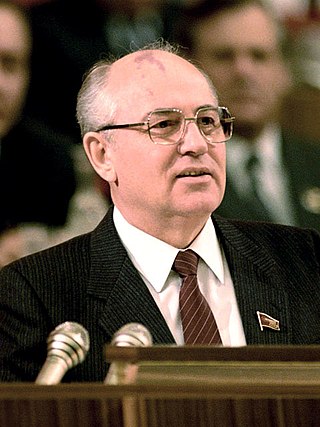
Mikhail Sergeyevich Gorbachev was a Soviet and Russian politician and statesman who served as the last leader of the Soviet Union from 1985 to the country's dissolution in 1991. He served as General Secretary of the Communist Party of the Soviet Union from 1985 and additionally as head of state beginning in 1988, as Chairman of the Presidium of the Supreme Soviet from 1988 to 1989, Chairman of the Supreme Soviet from 1989 to 1990 and the president of the Soviet Union from 1990 to 1991. Ideologically, Gorbachev initially adhered to Marxism–Leninism but moved towards social democracy by the early 1990s. He was the only Soviet leader born after the country's foundation.
State capitalism is an economic system in which the state undertakes business and commercial economic activity and where the means of production are nationalized as state-owned enterprises. The definition can also include the state dominance of corporatized government agencies or of public companies in which the state has controlling shares.
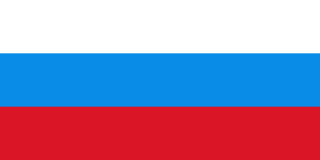
The modern history of Russia began with the Russian SFSR, a constituent republic of the Soviet Union, gaining more political and economical autonomy amidst the imminent dissolution of the USSR during 1988–1991, proclaiming its sovereignty inside the Union in June 1990, and electing its first President Boris Yeltsin a year later. The Russian Soviet Federative Socialist Republic was the largest Soviet Socialist Republic, but it had no significant independence before, being the only Soviet republic to not have its own branch of the Communist Party.
Bolshevism is a revolutionary socialist current of Soviet Leninist and later Marxist–Leninist political thought and political regime associated with the formation of a rigidly centralized, cohesive and disciplined party of social revolution, focused on overthrowing the existing capitalist state system, seizing power and establishing the "dictatorship of the proletariat".

Boris Abramovich Berezovsky, also known as Platon Elenin, was a Russian business oligarch, government official, engineer and mathematician and a member of the Russian Academy of Sciences. He had the federal state civilian service rank of 1st class Active State Councillor of the Russian Federation.

Presidential elections were held in Russia on 26 March 2000. Incumbent prime minister and acting president Vladimir Putin, who had succeeded Boris Yeltsin after his resignation on 31 December 1999, sought a four-year term in his own right and won in the first round.

Alexander Pavlovich Smolensky was a Russian business oligarch.

Vladimir Aleksandrovich Gusinsky is a Russian media tycoon. He founded the Media-Most holding company that included the NTV free-to-air channel, the newspaper Segodnya, and a number of magazines.
Russian oligarchs are business oligarchs of the former Soviet republics who rapidly accumulated wealth in the 1990s via the Russian privatisation that followed the dissolution of the Soviet Union. The failing Soviet state left the ownership of state assets contested, which allowed for informal deals with former USSR officials as a means to acquire state property.

Our Home – Russia was a Russian political party that existed from 1995 to the mid-2000s.
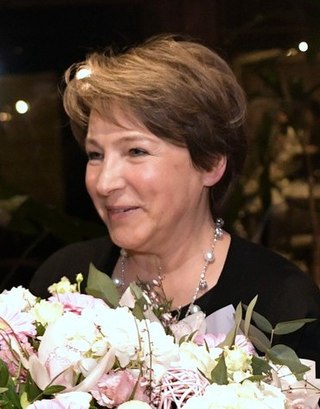
Tatyana Borisovna Yumasheva is the younger daughter of former Russian President Boris Yeltsin and Naina Yeltsina. Since 2009, Yumasheva has been a citizen of Austria.

Tycoon: A New Russian is a 2002 Russian movie directed by Pavel Lungin. The movie is based on the book The Lion's Share by Yuli Dubov, who later went on to work for oligarch Boris Abramovich Berezovsky.
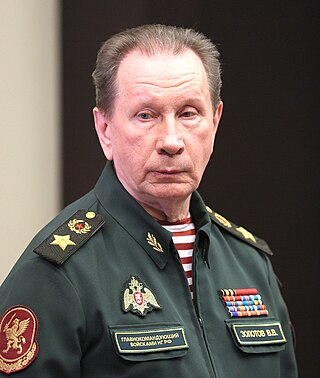
Viktor Vasilyevich Zolotov is a Russian military officer who is the Director of the National Guard (Rosgvardiya) and a member of the Security Council. Zolotov is a former bodyguard to former President Boris Yeltsin, former St. Petersburg Mayor Anatoly Sobchak, and current Russian leader Vladimir Putin. While working for Sobchak, Zolotov became acquainted with Putin, as well as figures in the St. Petersburg criminal underworld. A member of Putin's siloviki inner circle, Zolotov's rise to power and wealth happened after he became a close Putin confidant. The Zolotov family has obtained valuable land plots through dubious means.
A diverse variety of informal political groups emerged since the presidency of Vladimir Putin starting in 1999. They include remnants of the Yeltsin family, Saint Petersburg lawyers and economists, and security-intelligence elements called the siloviki.
The Semibankirschina, or seven bankers, was a group of seven powerful Russian business oligarchs who played an important role in the political and economic spheres of the Russian Federation between 1996 and 2000. In spite of their internal conflicts, members of the group worked together in order to re-elect Boris Yeltsin in the 1996 Russian presidential election, and thereafter to successfully manipulate him and his political environment from behind the scenes.
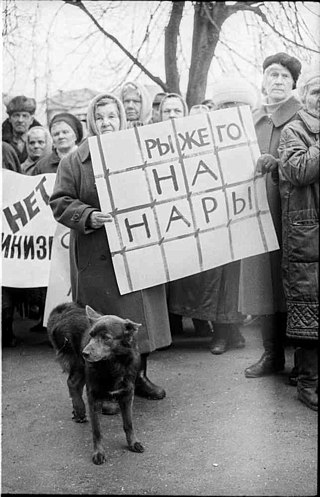
Privatization in Russia describes the series of post-Soviet reforms that resulted in large-scale privatization of Russia's state-owned assets, particularly in the industrial, energy, and financial sectors. Most privatization took place in the early and mid-1990s under Boris Yeltsin, who assumed the presidency following the dissolution of the Soviet Union.

Boris Nikolayevich Yeltsin was a Soviet and Russian politician and statesman who served as the president of Russia from 1991 to 1999. He was a member of the Communist Party of the Soviet Union from 1961 to 1990. He later stood as a political independent, during which time he was viewed as being ideologically aligned with liberalism.
The first significant attempt to implement communism on a large scale occurred in Russia following the February Revolution of 1917, which resulted in the abdication of Tsar Nicholas II. The Bolshevik Party, led by Vladimir Lenin, capitalized on the discontent with the Provisional government and successfully seized power in the October Revolution of the same year. Lenin's government began to transform Russian society through policies such as land redistribution, nationalization of industry, and withdrawal from World War I. After Lenin's death in 1924, Joseph Stalin's rise to power brought about rapid industrialization, forced collectivization, and widespread political repression, which solidified the Soviet Union's status as a major world power but at a tremendous human cost.

Beginning in 1995, Boris Yeltsin's government began privatizing state-owned shares in companies through a loans for shares scheme. The scheme helped with "fundraising" for Yeltsin's 1996 reelection campaign and restructuring freshly-sold companies at the same time.

Timothy James Colton is a Canadian-American political scientist and historian currently serving as the chair of The Harvard Academy for International and Area Studies, housed at the Weatherhead Center for International Affairs at Harvard University. Dr. Colton is the Morris and Anna Feldberg Professor of Government and Russian Studies. His academic work and interests are in Russian and post-Soviet politics. He is currently an editorial board member for World Politics and Post-Soviet Affairs. He has been a fellow of the American Academy of Arts and Sciences since 2011. He is the brother of former CBC Radio Washington, D.C. correspondent, Michael Colton.














